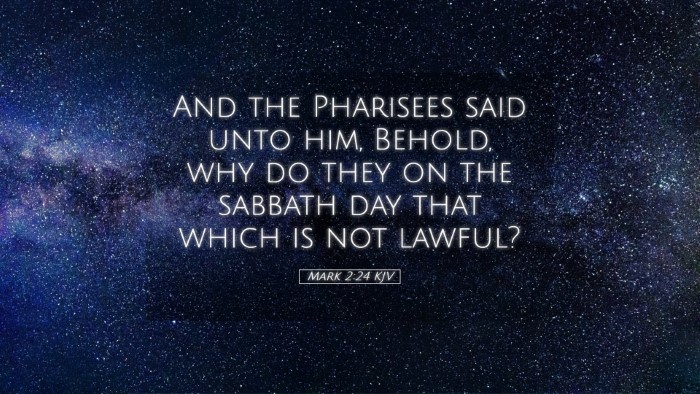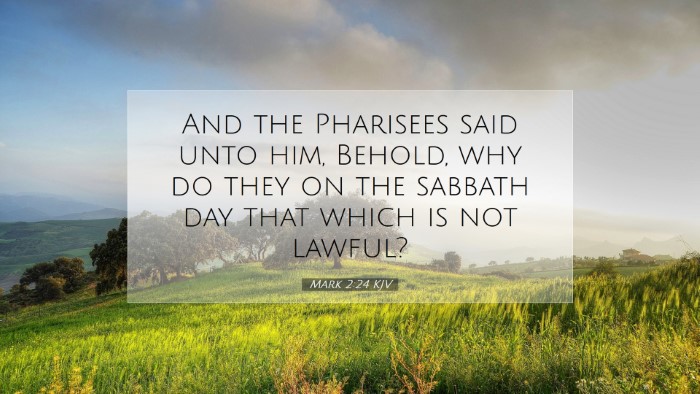Old Testament
Genesis Exodus Leviticus Numbers Deuteronomy Joshua Judges Ruth 1 Samuel 2 Samuel 1 Kings 2 Kings 1 Chronicles 2 Chronicles Ezra Nehemiah Esther Job Psalms Proverbs Ecclesiastes Song of Solomon Isaiah Jeremiah Lamentations Ezekiel Daniel Hosea Joel Amos Obadiah Jonah Micah Nahum Habakkuk Zephaniah Haggai Zechariah MalachiMark 2:24
Mark 2:24 KJV
And the Pharisees said unto him, Behold, why do they on the sabbath day that which is not lawful?
Mark 2:24 Bible Commentary
Commentary on Mark 2:24
Bible Verse: Mark 2:24 - "And the Pharisees said unto him, Behold, why do they on the sabbath day that which is not lawful?"
Introduction
The dialogue between Jesus and the Pharisees in Mark 2:24 touches on the delicate balance between the law and mercy, providing profound lessons for believers. In this passage, the Pharisees challenge the actions of Jesus' disciples who are accused of violating the Sabbath law. Through this commentary, we will explore the implications of this verse within the context of first-century Judaism, the nature of the law, and the person of Jesus Christ.
Contextual Analysis
The inquiry posed by the Pharisees is not merely an observation but a profound challenge to Jesus’ authority and interpretation of the law. This confrontation occurs after several notable events in Jesus' ministry, including the calling of Levi and the forgiveness of sins, setting the stage for deeper theological reflection.
Insights from Commentary
Matthew Henry's Commentary
Henry points out that the Pharisees were more concerned with their interpretations and traditions than the spirit of the law. They viewed their rigid adherence to the Sabbath as a means of measuring righteousness, thus missing the essence of God’s intent for the law, which is mercy and compassion. This criticism reflects the broader theme of how religious legalism can overshadow the deeper, relational understanding of God’s commandments.
Albert Barnes' Notes
Barnes elaborates on the significance of the Sabbath in Jewish tradition. He emphasizes that while the law was given for the good of the people, the Pharisees had imposed extra-biblical restrictions that hindered rather than helped. Barnes indicates that Jesus’ response to the Pharisees demonstrates that the needs of humanity take precedence over ritualistic observance. Jesus introduces a principle of mercy, showing that the lawful spirit of the Sabbath permits acts of necessity and kindness.
Adam Clarke's Commentary
Clarke addresses how the Pharisees represented a faction within Judaism that was rigid in its observance of the sabbatical law. He notes that the disciples were not transgressing the true intent of the law; instead, they were facing hunger—an essential human need. Clarke reflects on the idea that it is lawful to do good on the Sabbath; therefore, Jesus signifies a transformation in understanding God's law, prioritizing humanitarian acts over strict adherence to regulations.
Theological Implications
The confrontation embodies pivotal theological principles concerning the law, mercy, and the nature of God. It raises questions about obedience and the heart of the law-giver. Jesus illustrates that true spirituality is not merely about rule-following but about embodying the love and compassion of God.
The episode invites theological reflection on the role of the Sabbath. Jesus is portrayed not as an abolisher of the law but as one who fulfills it, offering a radical interpretation that focuses on love. The law becomes a means to nourish the soul rather than a burden.
Practical Applications
Mark 2:24 serves as a reminder to the church today about the nature of our own religious practices. Here are several applications for pastors, students, and theologians:
- Prioritize Human Needs: Church leaders must remember that ministry is not merely about maintaining traditions but about responding to needs with compassion and grace.
- Engage with Scripture: Encourage congregations to study Scripture critically and contextually, understanding the spirit of the law in light of Jesus’ teachings.
- Examine Legalism: Reflect on areas in which the church may have imposed additional burdens on people instead of offering mercy and grace.
- Model Jesus’ Attitude: Strive to emulate Jesus by exhibiting love and forgiveness, even when faced with opposition or challenge from established norms.
Conclusion
In Mark 2:24, Jesus’ interaction with the Pharisees transcends mere legal discussion; it captures the essence of His mission on earth—bringing understanding, compassion, and the fulfillment of the law as a means to express divine love. As we dissect these insights from various commentaries, it becomes clear that true theology leads to action—responding to human needs in alignment with God’s heart.


